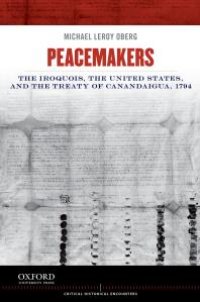
Ebook: Peacemakers : The Iroquois, the United States, and the Treaty of Canandaigua 1794
Author: Michael Leroy Oberg, Michael Leroy Oberg
- Tags: Iroquois Indians-History., Indians of North America-History-Colonial period ca. 1600-1775., United States-History-Colonial period ca. 1600-1775., United States-Politics and government-To 1775., Treaty of Canandaigua-(1794 November 11), HIS000000, HIS028000, HIS036000
- Series: Critical Historical Encounters Ser.
- Year: 2015
- Publisher: Oxford University Press
- City: Cary, United States
- Language: English
- pdf
Here, in a single volume, are the profiles of all the individuals and organizations that have been awarded the Nobel Peace Prize since its establishment in 1901. From the creator of the prize, Alfred Nobel, the Swedish industrialist who invented dynamite, to Jody Williams and the International Campaign to Ban Landmines, these individuals and organizations have devoted their lives to peace and have made our world a better place to live. Ann Keene chronicles the moving stories of the winners of the Nobel Peace prize in 79 essays that focus on the activities that earned each person or organization the prize. She includes fascinating anecdotes about and quotations from the recipients and, at the same time, introduces readers to major events in world history. The winners of the most prestigious peace award in the world include: Henri Dunant (1901), the founder of the International Committee of the Red Cross Theodore Roosevelt (1906), who, as President of the United States, mediated an end to the Russo-Japanese War in 1905; he was the first American to win the prize Fridtjof Nansen (1922), Norwegian humanitarian, scientist, and Arctic explorer Jane Addams (1931), peace activist and social reformer, and a founder of the Women's International League for Peace and Freedom Ralph J. Bunche (1950), who worked to achieve peace in the Middle East; he was the first African American to win the prize Lester Pearson (1957), who as a member of the Canadian delegation to the United Nations played a key role in ending the Suez Canal crisis Albert Luthuli (1960), former president of the African National Congress and outspoken opponent of South Africa's apartheid system Martin Luther King, Jr. (1964), U.S. civil rights activist United Nations Children's Fund (UNICEF) (1965), which continues to provide assistance to children in developing countries throughout the world Mairead Corrigan and Betty Williams (1976), cofounders of Peace People, an organization dedicated to ending violence in Northern Ireland Mother Teresa (1979), originally a high schoolteacher in India who won the prize for her work with the poor of Calcutta Elie Wiesel (1986), the author who has drawn international attention to the Holocaust Aung San Suu Kyi (1991), founder of the National League for Democracy in Myanmar (Burma) who lived under house arrest for six years Appendixes include a chronological listing of the Nobel Peace Prize Winners, a timeline recounting historic milestones in the peace movement, a listing of major peace organizations, a short glossary of terms, further reading, and an index. From the career diplomats and politicians to the ordinary people who discovered an opportunity to act on behalf of peace, these stories honor those who have made a profound difference in the world. Peacemakers is the ideal introduction to the Nobel Peace Prize for young readers and is an indispensable reference for anyone who is interested in world peace and history.
Download the book Peacemakers : The Iroquois, the United States, and the Treaty of Canandaigua 1794 for free or read online
Continue reading on any device:

Last viewed books
Related books
{related-news}
Comments (0)